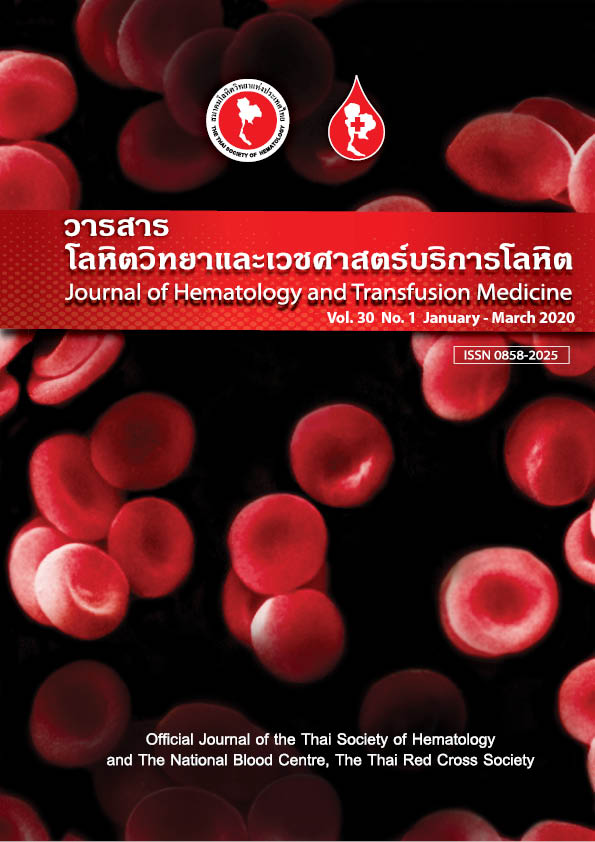การให้เลือดและการตรวจความเข้ากันได้ก่อนการให้เลือดในผู้ป่วยโรค multiple myeloma ที่รับการรักษาด้วยยา Daratumumab
Keywords:
Daratumumab, Multiple myeloma, Transfusion, Compatibility testingAbstract
บทคัดย่อ
บทนำ Daratumumab คือ Immunoglobulin G1 kappa (IgG1k) human monoclonal antibody ที่ออกฤทธิ์จับกับแอนติเจน CD 38 บนผิวเซลล์ ถูกนำมาใช้เป็นยารักษาผู้ป่วยโรค multiple myeloma (MM) แต่มีผลรบกวนการทดสอบความเข้ากันได้ก่อนการให้เลือด ดังนั้นในการจัดเตรียมเลือดที่ปลอดภัยให้กับผู้ป่วยที่ได้รับยา Daratumumab จำเป็นต้องมีการจัดหาวิธีเพื่อแก้ไขปัญหาดังกล่าว วัตถุประสงค์ เพื่อหาสัดส่วนผู้ป่วยที่ได้รับยา Daratumumab ที่จำเป็นต้องได้รับเลือดและผลลัพธ์ทางคลินิกของผู้ป่วย MM ที่ได้รับยา Daratumumab ที่ได้รับเลือด ซึ่งถูกทดสอบความเข้ากันได้เพิ่มเติมด้วยวิธี antigen matching ร่วมกับ DTT-treated antibody screening วัสดุและวิธีการ ก่อนการรักษาด้วยยา Daratumumab ผู้ป่วยจะได้รับการตรวจ ABO typing, RhD typing, antibody screening, direct antiglobulin test (DAT) และ antigen typing (C, c, E, e, Mia, Jka, Jkb, Fya, Fyb, S และ K) หลังได้รับการรักษาด้วยยา Daratumumab หากผู้ป่วยจำเป็นต้องได้เลือด จะใช้วิธีการทำ inhouse-DTT-treated antibody screening ร่วมกับการทำ antigen matching ในการจัดเตรียมเลือดให้ผู้ป่วย ผลการศึกษา ผู้ป่วย 22 ราย (ร้อยละ 70.1) จากทั้งหมด 31 ราย ที่ได้รับเลือดหลังได้รับการรักษาด้วยยา Daratumumab โดยค่าเฉลี่ยของ Hb ± ค่าเบี่ยงเบนมาตรฐานหลังได้รับเลือด 1 ถุง เป็นร้อยละ 1.03 ± 0.69 g/dL ในเพศชาย และร้อยละ 1.35 ± 0.71 g/dL ในเพศหญิง ผลการตรวจ antibody screening ให้ผลบวกทั้งหมด แต่เมื่อทำ inhouse-DTT-treated antibody screening พบให้ผลลบทั้งหมดยกเว้นผู้ป่วย 2 ราย ที่มีประวัติเคยตรวจพบ anti-Mia ก่อนได้รับการรักษาด้วยยา Daratumumab โดยไม่พบการสร้าง alloantibody อื่นเพิ่มเติม และไม่มีรายงานของการเกิด transfusion reaction หลังผู้ป่วยได้รับเลือด สรุป ผู้ป่วยที่ได้รับการรักษาด้วยยา Daratumumab มีความจำเป็นต้องรับการรักษาด้วยการให้เลือดมากกว่าร้อยละ 70 ทั้งก่อนและหลังการเริ่มรักษา แนวทางการทดสอบความเข้ากันได้ก่อนการให้เลือดในผู้ป่วย ด้วยวิธี antigen matching ร่วมกับ inhouse-DTT-treated antibody screening สามารถกำจัดการรบกวนขั้นตอนการทดสอบ indirect antiglobulin test (IAT) จากการได้รับยา Daratumumab ได้โดยยังคงสามารถตรวจพบ clinical significant red cell alloantibodies และสามารถใช้จัดหาเลือดให้แก่ผู้ป่วยได้อย่างมีประสิทธิภาพและปลอดภัย
Abstract:
Introduction: Daratumumab, an immunoglobulin G1 kappa (IgG1k) human monoclonal antibody binding CD38 on cell membrane, is globally used in multiple myeloma (MM) treatment. However, this medication interferes pre-transfusion compatibility testing. To provide safe blood transfusion for patient receiving Daratumumab, the protocol for this case had to be implemented. Objective: To investigate the demand of transfusion in MM patients after treated by Daratumumab and evaluate the efficiency of blood-transfusion preparation protocol by DTT-treated antibody screening and antigen matching . Materials and Methods: All Daratumumab-treated MM patients were required to send 6 mL-EDTA blood before Daratumumab administration to test ABO typing, RhD typing, antibody screening, direct antiglobulin test (DAT) and antigen typing (C, c, E, e, Mia, Jka, Jkb, Fya, Fyb, S and K). When patients required blood transfusion, DTT-treated antibody screening and antigen matching were tested simultaneously to determine the compatible blood. Results: From 31 Daratumumab-treated MM patients, there were 22 patients required blood transfusion (70.1%). The mean hemoglobin concentration ± standard deviation increased 1.03 ± 0.69 g/dL in male patients and 1.35 ± 0.71 g/dL in female patients after one unit of red cell transfusion. The results of conventional antibody screening were positive in all patients compared to DTT-treated antibody screening, the results were negative except two patients who had been detected anti-Mia before Daratumumab administration. New alloantibody and transfusion reaction were not found in this study. Conclusion: Seventy percent of Daratumumab-treated MM patients require blood transfusion before and after Daratumumab administration. Antigen matching and inhouse-DTT-treated antibody screening reduce interference in indirect antiglobulin test (IAT) from Daratumumab. This protocol could detect clinical significant red cell antibodies and provide the efficient and safest blood transfusion to patients.
Downloads
References
2. Navarnwong W. Guideline of the management of multiple myeloma. In: Weerasak Navarnwong TN, editor. Guidelines for diagnosis and treatment of hematologic diseases. Bangkok: Thai Society of Hematology; 2017.
3. Thai Myeloma Working Group. Guidelines for the management of Multiple Myeloma [Internet]. 2010 [cited 2019 May 7]. Available from: https://www.tsh.or.th/files_news/newsFile_20110509164842.pdf.
4. Tzogani K, Penninga E, Schougaard Christiansen ML, Hovgaard D, Sarac SB, Camarero Jimenez J, et al. EMA review of Daratumumab for the treatment of adult patients with multiple myeloma. The oncologist. 2018;23(5):594-602.
5. Suwanwuthichai P. Pre-transfusion testing for patients receiving the Daratumumab. J Med Assoc Thai. 2018;28:479-81.
6. Chapuy CI, Nicholson RT, Aguad MD, Chapuy B, Laubach JP, Richardson PG, et al. Resolving the Daratumumab interference with blood compatibility testing. Transfusion. 2015;55:1545-54.
7. Oostendorp M, Lammerts van Bueren JJ, Doshi P, Khan I, Ahmadi T, Parren PW, et al. When blood transfusion medicine becomes complicated due to interference by monoclonal antibody therapy. Transfusion. 2015;55(6 Pt 2):1555-62.
8. Chari A, Arinsburg S, Jagannath S, Satta T, Treadwell I, Catamero D, et al. Blood Transfusion Management and Transfusion-Related Outcomes in Daratumumab-Treated Patients With Relapsed or Refractory Multiple Myeloma. Clinical Lymphoma Myeloma and Leukemia. 2018;18(1):44-51.
9. Chapuy CI, Aguad MD, Nicholson RT, AuBuchon JP, Cohn CS, Delaney M, et al. International validation of a dithiothreitol (DTT)-based method to resolve the Daratumumab interference with blood compatibility testing. Transfusion. 2016;56(12):2964-72.
10. Chapuy CI, Nicholson RT, Aguad MD, Chapuy B, Laubach JP, Richardson PG, et al. Resolving the Daratumumab interference with blood compatibility testing. Transfusion. 2015;55(6 Pt 2):1545-54.
11. Selleng K, Gebicka PD, Thiele T. F(ab')2 Fragments to Overcome Daratumumab Interference in Transfusion Tests. The New England journal of medicine. 2018;379(1):90-1.
12. Dimopoulos MA, Oriol A, Nahi H, San-Miguel J, Bahlis NJ, Usmani SZ, et al. Daratumumab, Lenalidomide, and Dexamethasone for Multiple Myeloma. New England Journal of Medicine. 2016;375(14):1319-31.
13. Fongsarun J, Nuchprayoon I, Yod-in S, Kupatawintu P และ Kidprasirt C. Blood Groups in Thai Blood Donors. J Med Assoc Thai. 2002;12:277-86.



